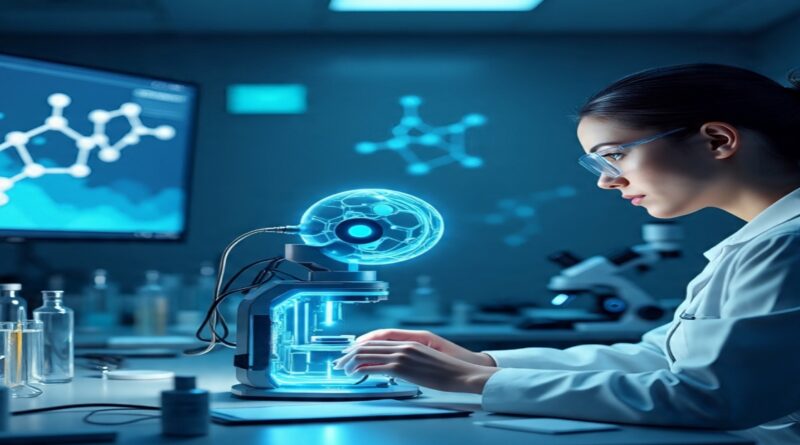How Artificial Intelligence is Changing Modern Science
In the last decade, technology has advanced at a speed that was once unimaginable, and one of the biggest driving forces behind this revolution is Artificial Intelligence (AI). When we ask how artificial intelligence is changing modern science, the answer is simple yet vast—it is transforming the way research is conducted, discoveries are made, and problems are solved. From analyzing massive datasets to developing new medicines, AI is now at the core of almost every scientific field.
How Artificial Intelligence is Changing Modern Science in Medicine.
Perhaps the most visible impact of AI is in medical science. Doctors and researchers are using AI to diagnose diseases, design personalized treatments, and even predict patient health risks before symptoms appear. AI-powered tools like MRI scanners, robotic surgeries, and health monitoring apps are saving lives daily.
Pharmaceutical companies are also using AI to speed up the drug discovery process. What oonce took decades can now be done in just a few years. By simulating how molecules interact, AI helps scientists create safer and more effective medicines. This shows how artificial intelligence is changing modern science by directly improving human health.
How Artificial Intelligence is Changing Modern Science in Space Exploration.
Space is one of the most complex frontiers for scientists, and AI is playing a huge role in making discoveries possible. From analyzing images captured by satellites to controlling autonomous rovers on Mars, AI is at the center of space exploration.
NASA, for instance, uses AI to study cosmic data and to identify patterns that would take humans years to detect. AI also helps spacecraft navigate independently, reducing dependence on ground control. This demonstrates how artificial intelligence is changing modern science by expanding our knowledge beyond Earth.
How Artificial Intelligence is Changing Modern Science in Climate Research.
Climate change is one of the biggest challenges facing humanity, and AI is giving scientists powerful tools to address it. AI systems analyze satellite data, track deforestation, monitor air pollution, and even predict natural disasters such as floods, hurricanes, and earthquakes.
By creating accurate climate models, AI helps governments and organizations take preventive measures to protect lives and resources. This is another way how artificial intelligence is changing modern science by contributing solutions to global problems.
How Artificial Intelligence is Changing Modern Science in Education and Research
AI is not only used in professional labs but also in classrooms and universities. Students and researchers now have access to AI-powered tools that assist in simulations, experiments, and academic writing. Virtual laboratories allow experiments to be conducted digitally, reducing costs and risks.
Moreover, AI helps researchers find relevant scientific papers quickly by scanning vast databases. This accelerates the process of innovation and knowledge sharing. Thus, how artificial intelligence is changing modern science is also visible in the way education and learning evolve.
How Artificial Intelligence is Changing Modern Science through Robotics.
Robotics is another field where AI has completely transformed modern science. AI-driven robots are now used in dangerous environments such as nuclear plants, deep-sea exploration, and disaster zones. In laboratories, robots automate repetitive experiments, giving scientists more time to focus on critical thinking and innovation.
Robotics combined with AI is also helping in agriculture by creating smart farming solutions and in engineering by designing structures with high precision. These advancements highlight how artificial intelligence is changing modern science by merging human creativity with machine efficiency.
Challenges in How Artificial Intelligence is Changing Modern Science.
While AI has brought remarkable progress, it also comes with challenges. Ethical concerns, data privacy, and the possibility of over-reliance on machines are some issues scientists face. If not carefully managed, AI may even replace human jobs in certain research areas.
However, with proper regulation and responsible use, the benefits of AI far outweigh the risks. Therefore, when we look at how artificial intelligence is changing modern science, it is important to consider both its advantages and challenges.
Conclusion: How Artificial Intelligence is Changing Modern Science
In conclusion, AI is no longer just a futuristic concept; it is a reality shaping our world today. From medicine to space, climate to education, robotics to data analysis, the impact of AI is visible everywhere. Asking how artificial intelligence is changing modern science leads to only one answer: it is revolutionizing every aspect of discovery and innovation.
As technology continues to evolve, AI will open even more doors for groundbreaking achievements. The future of science is deeply tied to artificial intelligence, and together they will continue to redefine human progress.



